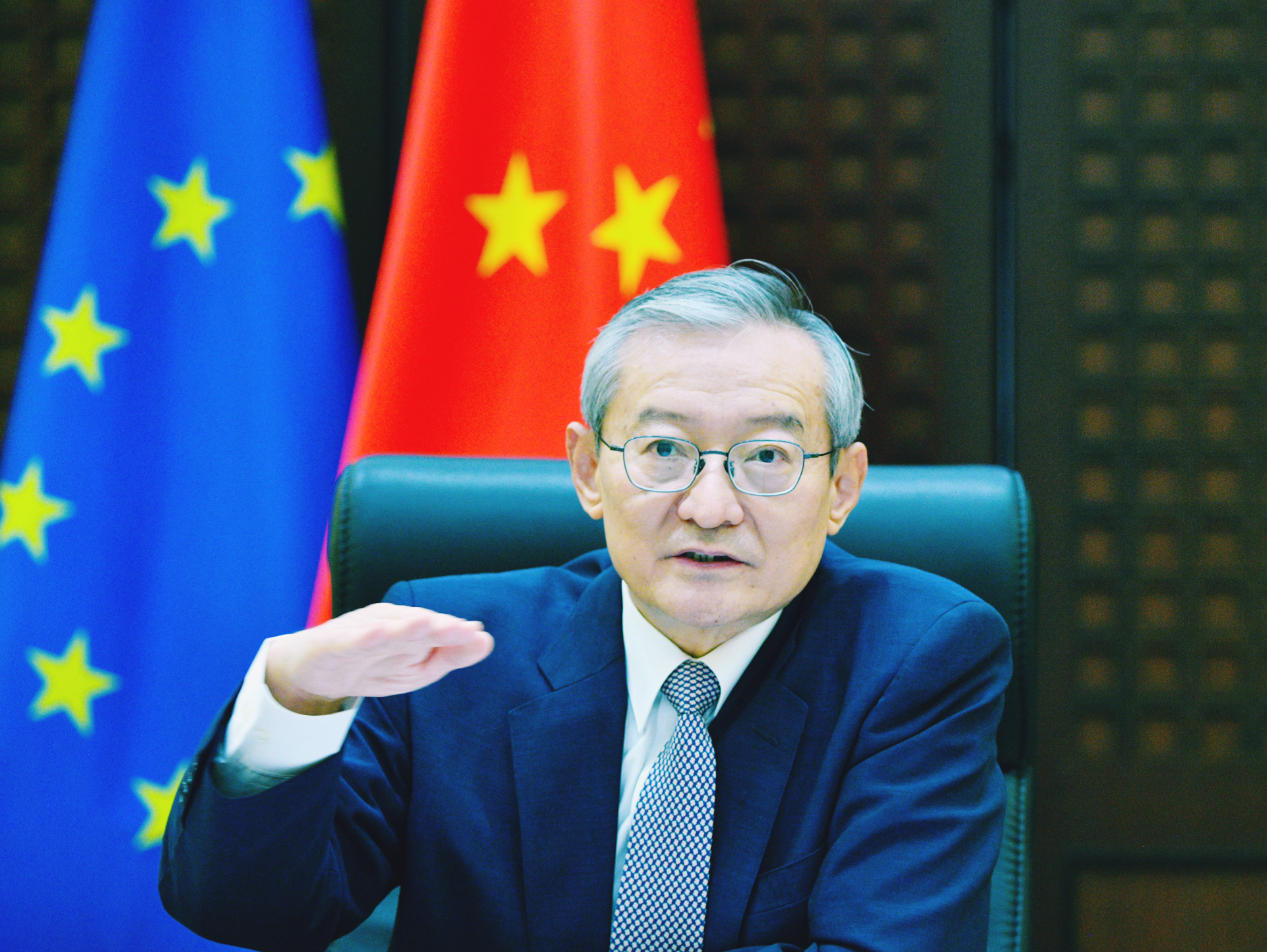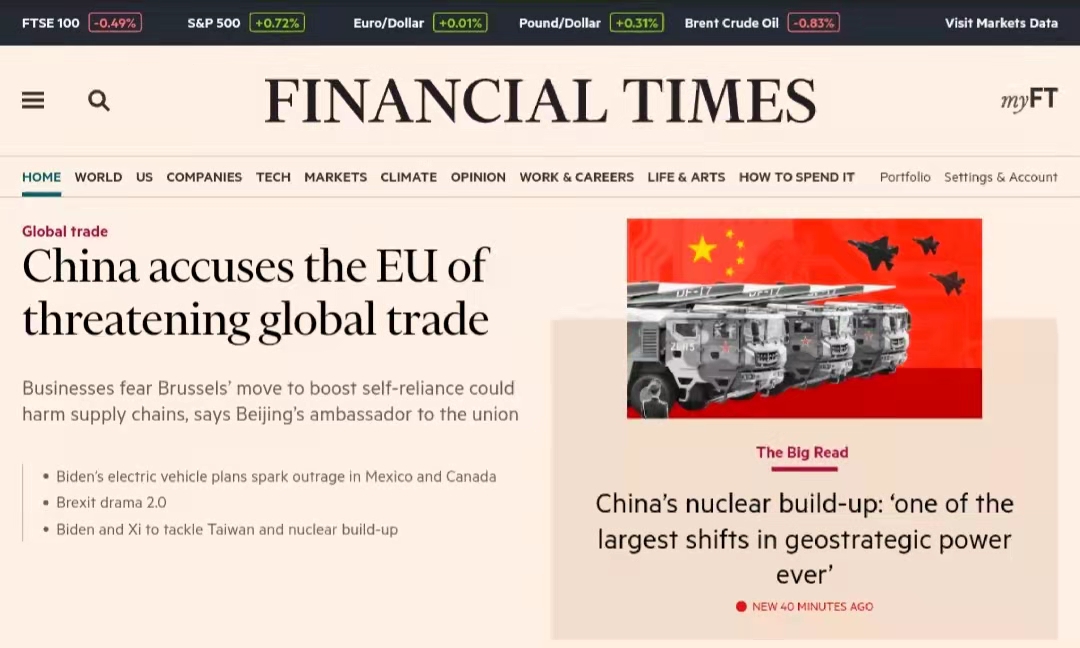
On 10 November 2021, Ambassador Zhang Ming, Head of the Chinese Mission to the EU, sat down with Sam Fleming, Brussels Bureau Chief of the Financial Times (FT), and Andy Bounds, FT's EU correspondent, for an exclusive interview. Answering a question on the China-EU relations and the Comprehensive Agreement on Investment (CAI), Ambassador Zhang Ming made the following remarks.
China-EU relations have experienced ups and downs, including important developments and also challenges. Both developments and challenges can be manifested in our relations in the political and economic sectors.
In terms of business cooperation between the two sides, in these past two years, despite difficulties, China-EU business cooperation has developed very well. Last year was a very difficult year for the whole world as the pandemic ravaged. However, in last year, China-EU bilateral trade volume increased, and China made it for the first time to the EU’s largest trading partner. In the first three quarters of this year, such kind of growth continued and became even more robust. Bilateral trade volume was estimated to reach almost 600 billion USD in the first three quarters, with an increase rate higher than 30%. Bilateral FDI is also on the increase, which demonstrates the resilience of our business ties.
Last year, the two sides also signed the China-EU GI Agreement which took effect in March this year. Maybe the European public is not very familiar with GI products from China, but Chinese people are quite familiar with GI products from Europe. It can be said that they have truly benefited from this agreement. I do not know whether you noticed that the Chinese Mission to the EU, aside from promoting the signing of the agreement, also helped with its implementation. We hope we can facilitate the trade of GI products between the two sides.
Another important achievement in trade was the signing of the CAI. The agreement actually took 35 rounds of negotiations covering a time span of 7 years. Both China and the EU believe the CAI is a very good investment agreement that is high-level, balanced, and comprehensive. The CAI carries great expectations from all sides. I myself have prioritized the signing of the agreement as one of the most important tasks during my time in Brussels.
Regrettably, because of internal issues from the European side, the ratification of the agreement has met certain difficulties. I learned that both our economic communities have been calling for breaking the deadlock and ratifying the agreement as soon as possible. I understand and identify with such appeals.

In order to solve the problem and to push forward the ratification of the agreement, I think the first step we need to take is to return to the essence of the agreement, which concerns trade and economic cooperation. I agree with such opinions from the European side that the agreement concerns the trade and economic arrangement between China and the EU. We cannot count it to solve all problems between us. Unfortunately, the agreement has been severely politicized these days. It was given too many political connotations that outweigh its capacity. I noticed that recently the CEO of Siemens, together with many other business representatives from the European side claimed that economic relations should not become the plaything of political interests. I think it’s important that the European side listens to the appeals and suggestions of our business communities.
For the second step, I think we need to push for a normalized ratification process. Though the ratification has met difficulties, our two governments have been working on text proofreading and other legal procedures. That said, we need to admit that difficulties still face the ratification of the agreement. The agreement is about promoting the win-win business cooperation between China and the EU. Its ratification should not be abducted by forces that don’t care about the interests of our two business communities and peoples. I find such attempts unrealistic if they want to use this agreement as a stick to hit China or want to use it to suppress our opening-up and development.
The third step, I think, is that we need to have a sense of urgency. I hope we don’t have to take another 7 years to ratify the agreement. China’s attitude towards this agreement has always been positive and our all-round opening-up will continue to deepen. The RCEP, to which China is also a member, will officially take effect on January 1 next year. After that, the RCEP will become the world’s largest Free Trade Zone. China recently also announced its application to join the CPTPP and DEPA. I believe you’ve also noticed that last week, in his speech at the opening ceremony of the CIIE, President Xi Jinping announced that China will further shorten the Negative List for Foreign Investment Access, orderly open up the service sector including telecommunication, medical care amongst others, and take a positive attitude to participate in negotiations on the digital economy, trade environment, industry subsidies and state-owned enterprises. These are all China’s self-initiated opening-up measures.
China will not stop its steps of reform and opening up because of temporary difficulties facing the ratification of the CAI. We hope that European enterprises can better benefit from China’s development opportunities. It is also hoped that our development can enjoy the broader participation of European enterprises.
China’s attitude towards the CAI remains unchanged. The current difficulties facing its ratification are caused by the European side. The ball is in the EU’s court. We hope the European side can face up to the appeals of the business communities and the public, return to the original spirit and essence of the agreement, and do not let political manipulation interfere with the ratification. We are willing to make joint efforts with the European side in this regard.

